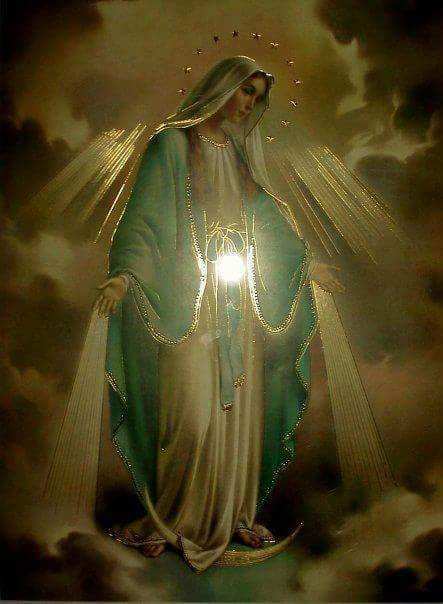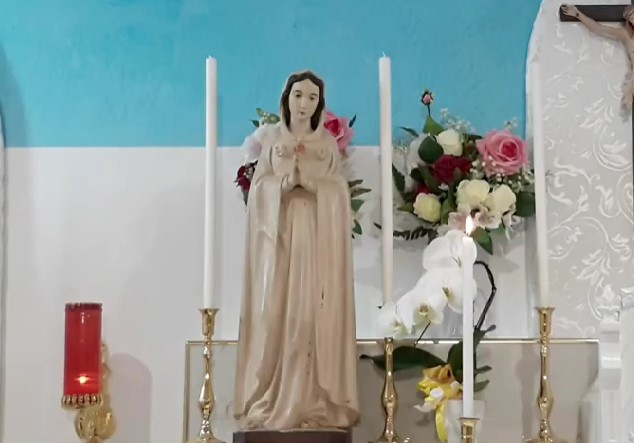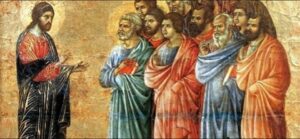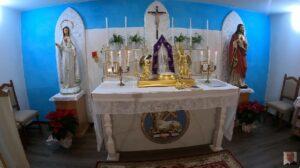

DALL’OMELIA DI DON ENRICO RONCAGLIA (*,1)
At 2,1-11
Mentre stava compiendosi il giorno della Pentecoste, si trovavano tutti insieme nello stesso luogo. Venne all’improvviso dal cielo un fragore, quasi un vento che si abbatte impetuoso, e riempì tutta la casa dove stavano. Apparvero loro lingue come di fuoco, che si dividevano, e si posarono su ciascuno di loro, e tutti furono colmati di Spirito Santo e cominciarono a parlare in altre lingue, nel modo in cui lo Spirito dava loro il potere di esprimersi.
Gv 14,15-16.23b-26
In quel tempo, Gesù disse ai suoi discepoli: «Se mi amate, osserverete i miei comandamenti; e io pregherò il Padre ed egli vi darà un altro Paràclito perché rimanga con voi per sempre.
Se uno mi ama, osserverà la mia parola e il Padre mio lo amerà e noi verremo a lui e prenderemo dimora presso di lui. Chi non mi ama, non osserva le mie parole; e la parola che voi ascoltate non è mia, ma del Padre che mi ha mandato.
Una buona Santa Pentecoste! Chiediamo al Signore per intercessione di Maria affinche’ lo Spirito Santo faccia discendere con abbondanza le sue grazie!
Dopo la predicazione di tre anni, tutti gli apostoli sono passati attraverso la prova della croce. che li ha santificati. Ma questo dopo averlo tradito e rinnegandolo, come Pietro!
L’unico che e’ rimasto fedele e’ stato Giovanni. Cio’ perche’ era rimasto vicino al Maria.
San Pietro, invece, non era ancora pronto. Mancava soprattutto la discesa dello Spirito Santo! Questo evento e’ stato l’inizio della Chiesa. Pietro non ha piu’ rinnegato la parola di Dio e la Fede!
Il Concilio Vaticano I (2) tramite la Costituzione Apostolica “Pastor Aeternus” (3), ha sancito l’infallibilita’ del Papa sulle questioni di fede e l’insegnamento morale, quando le pronunce avvengono “ex cathedra”, cioe’ siano proclamazioni solenni (4).
Lo Spirito Santo si e’ manifestato come fuoco, le cui fiammelle sono scese sulle teste e nei cuori dei discepoli! Lo Spirito Santo ha dato loro la forza di evangelizzazione in tutto il mondo!
Ma adesso la Chiesa si e’ chiusa allo Spirito Santo! Molti sacerdoti non predicano piu’ la parola di Dio, le loro parole non sono ascoltate ne’ comprese! Come conseguenza la fede viene abbandonata!
Ma sappiamo che il Signore cerca fedeli pronti ad aprirsi all’amore e al fuoco dello Spirito Santo!
Rispondiamo al Suo appello! Il primo segno sara’ un fragore di tuono! Le case e i cuori si riempiranno della Sua presenza! Ci aiutera’ e guidera per diventare suoi operatori di carita’, capaci di parlare lingue nuove. Per portare l’amore di Gesu’!
Sia lodato Gesu’ Cristo! Sempre sia lodato!
____________________
(*) Questo commento e’ scritto in tempo reale durante l’omelia. Mi scuso per l’eventuale misinterpretazione delle parole di Don Enrico.
(1) La Cappella dei Sacri Cuori e’ d’ora in avanti sotto la protezione della Madonna Pellegrina di Montichiari (Brescia, 1946).
(2) 8 dicembre 1869 – interrotto il 20 ottobre 1870, chiuso ufficialmente nel 1960, prima del Concilio Vaticano II.
(3) Costituzione Apostolica “Pastor Aeternus”. Il Concilio Vaticano I, fin dall’inizio (8 dicembre 1869) per la volonta’ della maggioranza dei Padri Conciliari (450 contro 150), decise di investire la discussione sulla questione dell’infallibilita’. Il 18 luglio 1870 fu letto il testo definitivo della Pastor Aeternus e si procedette alla votazione. Su 535 vescovi presenti, 533 dettero la loro approvazione: gli unici due vescovi contrari aderirono subito al parere unanime dei loro colleghi. Pio IX sanzionò immediatamente il testo e si cantò il Te Deum di ringraziamento.
(4) In realta’ la Costituzione Apostolica “Pastor Aeternus” non dice nulla di nuovo riguardo all’infallibilita’ papale:
a) Infatti l’infallibilita’ papale e’ già presente nella coscienza e nella prassi della Chiesa cattolica; e riguarda solo gli interventi ex cathedra, ossia quando il pontefice impegna la propria autorità;
b) e benché il papa non abbia il dovere giuridico di ascoltare l’episcopato quando impegna questa sua autorità (questo il senso del non autem ex consensu Ecclesiae), tuttavia non esprimerà mai niente di contrario o di diverso da ciò che già la Chiesa crede e vive (dunque ha l’obbligo di un consenso morale).
FROM THE HOMILY BY DON ENRICO RONCAGLIA (**,1)
Acts 2: 1-11 While the day of Pentecost was coming to an end, they were all together in the same place. Suddenly a roar came from heaven, almost a rushing wind, and filled the whole house where they were staying. Tongues like fire appeared to them, split up, and settled on each of them, and all were filled with the Holy Spirit and began to speak in other tongues, in the way that the Spirit gave them the power to express themselves.
Jn 14.15-16.23b-26 At that time, Jesus said to his disciples: “If you love me, you will keep my commandments; and I will pray to the Father and he will give you another Paraclete to remain with you forever. If anyone loves me, he will keep my word and my Father will love him and we will come to him and make our home with him. Whoever does not love me does not keep my words; and the word you hear is not mine, but the Father’s who sent me.
A good Holy Pentecost! Let us ask the Lord through Mary’s intercession for the Holy Spirit to make his graces descend with abundance!
After three years of preaching, all the apostles passed through the trial of the cross. who sanctified them. But this after having betrayed him and denied him, like Peter!
The only one who remained faithful was Giovanni. This is because he had remained close to Maria. St. Peter was not ready yet.
Above all, the descent of the Holy Spirit was missing! This event was the beginning of the Church. Peter no longer denied the word of God and the Faith!
The Vatican Council I (2) through the Apostolic Constitution “Pastor Aeternus” (3), sanctioned the infallibility of the Pope on questions of faith and moral teaching, when the pronouncements take place “ex cathedra”, that is, proclamations solemn (4).
The Holy Spirit manifested himself as fire, whose flames fell on the heads and hearts of the disciples! The Holy Spirit has given them the power to evangelize all over the world!
But now the Church has closed itself to the Holy Spirit! Many priests no longer preach the word of God, their words are neither heard nor understood!
As a result, faith is abandoned! But we know that the Lord is looking for faithful ready to open themselves to love, to the fire of the Holy Spirit!
We answer your call! The first sign will be a crash of thunder! Homes and hearts will be filled with His presence!
He will help us and guide us to become his charitable workers, capable of speaking new languages. To bring the love of Jesus!
Praised be Jesus Christ. Always be praised!
___________________
(**) This comment is written in real time during the homily. I apologize for any misinterpretation of Don Enrico’s words
(1) The celebration Chapel of Sacred Hearts from now on is set under the protection of the Pilgrim Madonna of Montichiari (Brescia, Italy, 1946).
(2) December 8, 1869 – interrupted on October 20, 1870, officially closed in 1960, before the Second Vatican Council.
(3) Apostolic Constitution “Pastor Aeternus”. The First Vatican Council, from the beginning (December 8, 1869) by the will of the majority of the Council Fathers (450 against 150), decided to invest the discussion on the question of infallibility. On July 18, 1870, the definitive text of Pastor Aeternus was read and the vote was taken. Out of 535 bishops present, 533 gave their approval: the only two bishops against it immediately adhered to the unanimous opinion of their colleagues. Pius IX immediately sanctioned the text and the Te Deum of thanksgiving was sung.
(4) In reality, the Apostolic Constitution “Pastor Aeternus” says nothing new about papal infallibility:
a) In fact, papal infallibility is already present in the conscience and practice of the Catholic Church; and it concerns only ex cathedra interventions, that is, when the pontiff commits his own authority;
b) and although the pope does not have the juridical duty to listen to the episcopate when he commits his authority (this is the meaning of the non autem ex consensu Ecclesiae), nevertheless he will never express anything contrary or different from what the Church already believes and lives (therefore it has the obligation of a moral consent).

